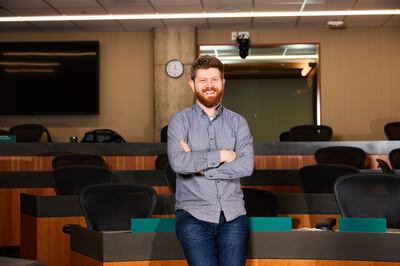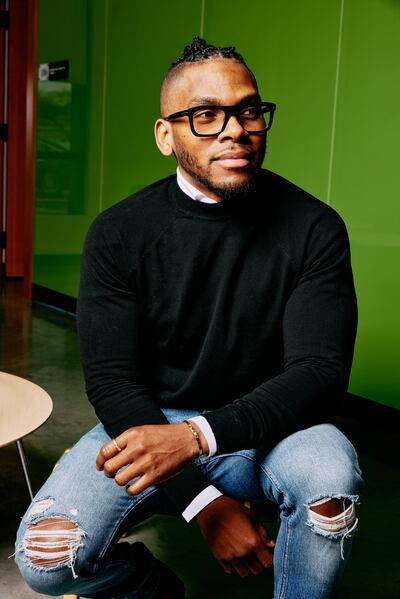This story is published in cooperation with Willamette Week and University of Oregon Executive MBA.
Have you ever come across a cool new charity or nonprofit and thought to yourself “Wow, I wish I could get involved in something like that”? Or perhaps you have your own unique, never-been-done-before idea that would meet the needs of tons of people—but you just have no clue where you’d even begin? Well, the truth is, that’s how most great businesses start. All that’s left to do is pair that drive with some expert guidance and a wide-ranging suite of skills, and you’re in business.
That’s right, we’re talking business school–specifically the University of Oregon’s Executive MBA program, based here in Portland. And before you say “I’m not really the business type”... Hear us out.
The University of Oregon’s Executive MBA Program is for those who want to grow in a business of any kind—even if it isn’t a for-profit business in the traditional sense.
Three students currently pursuing their degrees are Marches Armstrong, Ross Kanaga, and Fidel Ferrer—all of whom work in the nonprofit sector. And they can attest that they’re getting just as much out of business school, if not more, as their peers in the “for-profit” sector. Here’s why they took the leap to pursue an MBA.

“When I first started the [Executive MBA] program, it was exhilarating. But [there was] also a bit of anxiety,” says Marches Armstrong, who will graduate in 2025. “I was starting a new job in a new industry, while also learning new cultures all while balancing my family life.”
The U.S Navy Veteran and his family had just moved to Portland from Hawaii, where Armstrong worked as an analyst within Maui County’s public safety division. Upon moving, Armstrong was looking for a job that was “unique and impactful in terms of a societal good.”
And at the Northwest Portland Area Indian Health Board—a tribal advisory nonprofit organization that serves 43 federally recognized tribes of Oregon, Washington, and Idaho—he found exactly that.
Armstrong now serves as an IT Data & Applications Specialist at NPAIHB, and is currently working on a project related to Data Modernization in Public Health. Alongside pursuing his MBA, of course.
“At the fundamental level, the [Oregon Executive MBA] program has changed my mindset as I navigate my current role at NPAIHB,” says Armstrong. “It has shifted me to step out of my comfort zone as merely an IT and more into [having] a bigger picture business mindset, with a background in IT.”
Working alongside students in the for-profit sector gives Armstrong “a glimpse of what the other side is like.” He’s found that other IT-oriented students in the for-profit realm deal with the same things IT folks deal with in the nonprofit realm—and believes that some aspects can be transferred over, regardless of operating model.

“In the end, we’re all in the business of solving problems and managing teams that solve problems,” agrees Ross Kanaga, another member of the class of 2025. ”Our stakeholders or customers may be different, but many of our core challenges and opportunities have strong parallels.”
Kanaga, a financial innovation manager, has been working at DevNW— a community development nonprofit that helps low-to-moderate income households in Oregon work towards financial stability—for the past 11 years, and says he is impressed with how many of his executive MBA peers “approach problems using an equity lens or a human-centered approach.”
A big reason Kanaga decided to pursue the Executive MBA is because of the emphasis that the program places on peer-based learning. Kanaga hoped to obtain a breadth of knowledge and experience from his University of Oregon peers, no matter which business operating model they follow, and he hasn’t been disappointed.
“My year one [study] team has an attorney, a human resources director, a clean energy manager, and a manager for the Jordan brand,” says Kanaga. “We approach problems from such diverse perspectives, and I love being challenged to think in new ways.”

Class of 2025′s Fidel Ferrer, on the other hand, says he found himself a bit intimidated by the program and his peers when he first started. Ferrer had business accolades to boast of prior to pursuing his MBA—such as receiving the Executive of the Year award for social impact from the Portland Business Journal last year—still, he says that being “surrounded by such a high level of talent made him feel out of place at times.” But he felt the importance of investing in himself professionally to become a better leader, he says.
Ferrer immigrated to the U.S. from Cuba with his mother and twin sister roughly 12 years ago and currently lives in Portland. In 2019, he launched a nonprofit called Project LEDO, which aims to inspire and empower young, underrepresented, and marginalized BIPOC communities of students in STEAM. The nonprofit works closely with Title 1 schools in greater Oregon.
“I have experienced first-hand the struggles BIPOC individuals in the science community [face] due to lack of representation in our region,” says Ferrer. “[So] I founded this organization because I felt the need to drive change and bridge the technological divide within communities.”
Although there were some initial nerves going into the program, he’s grown close with his peers, and says that his time spent within the Executive MBA program thus far has been “nothing short of great.”
“I used to believe that I wasn’t the right fit because I used to think that these programs were only meant for highly accomplished business moguls,” he says. “However, I often find my peers also being inspired by my insight and asking a lot of questions seeking my perspective, which validates the notion that I do, in fact, belong there.”
Learn more about the University of Oregon’s Portland-based MBA program.
